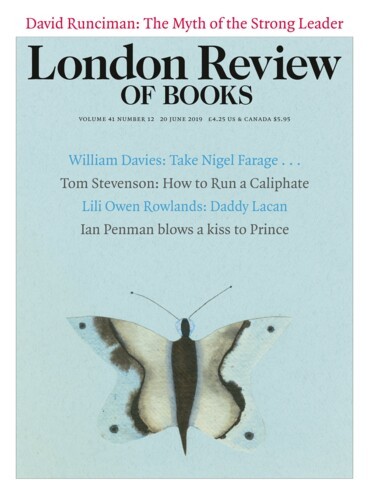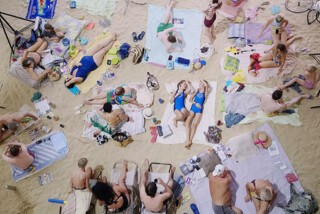It rained off and on during the opening week of the Venice Biennale, and the Lithuanian pavilion hadn’t prepared for bad weather. An indoor beach had been set up inside a former military building opposite the Arsenale: sunloungers were out, spotlights switched on, imported Lithuanian sand covered the floor. The pavilion was ready for its performers, but the performers were in swimming costumes and they were shivering. A curator went out to buy electric blankets, and came back empty-handed: not many shops in Venice sell electric blankets in May. Eventually some were sourced, delivered and concealed under beach towels, and their cables covered over with sand.
Sun and Sea (Marina) is an hour-long opera written by three Lithuanian women, Lina Lapelytė, Vaiva Grainytė and Rugilė Barzdžiukaitė. Viewers look down on the beach from a minstrels’ gallery: the idea is to gaze or glare at the holidaymakers from the perspective of the sun. Only a handful of journalists came through the rain to attend the press viewing. A few days later the real, outdoor sun was visible again, but the curators decided to keep the electric blankets under the beach towels just in case. The weather was unpredictable.
I was in Venice to give a reading at the pavilion and I hadn’t yet seen the performance. Arriving two days after the press viewing, I couldn’t just walk in. Although few reviews had yet been published, and although it was difficult to find the pavilion, the queue stretched around the building’s courtyard and out towards the street; people waited for two hours. When at last I got inside it was hot and dim in the crowded viewing gallery: churchy. The music sounded choral: low, and sung almost sleepily by the Lithuanian and Venetian performers. Grainytė’s libretto is a cycle of discrete, loosely linked hymns to the aeroplanes in the sky, the ships on the sea and the sandwich wrappers on the beach. The characters are mostly strangers to one another; there’s no overarching narrative gathering them together – the connecting thing is that they are all on holiday on the same stretch of sand. Stories drift up to the audience. One wealthy character reminisces about drinking piña coladas on a diving trip to the Great Barrier Reef (‘included in the price!/They taste better under the water’). A philosopher pontificates on imported snacks and mass-produced swimwear. A long-distance couple sing about the sadness of the departure gate. Somebody recalls finding spring moss and chanterelles in the woods last Christmas Day. Another person complains about the litter (‘is it so hard/to walk to a trash bin, or what?’). A workaholic sings about the difficulty he has in switching off. Too much relaxing, he believes, is the reason the mammoth went extinct.
These sketched stories are almost serious (too much relaxing on foreign beaches is, in its way, driving the species towards extinction), and they are sent up with operatic solemnity by the languid performers, who sing while playing on their phones, fanning their faces with their newspaper supplements or rubbing in sunscreen. Taken together and viewed from above, the firmly trivial and personal stories expose something global. There is no stable narrative or story, but each song describes globalised bodies on the move.
The opera belongs to a rare species of ecological writing in that it involves something recognisable as normal life and it’s about having fun. Where it refers directly to climate change it does so only lightly or at a slant. Bees are ‘massively falling from the sky’. Maybe we could 3D-print some coral reef replacements? This isn’t like the familiar climate change of nature narratives, or apocalypse fiction, or stories about environment enthusiasts: niches in which climate change announces itself as a subject. I love all those approaches, but they are always somehow constrained by the stubbornly powerful feeling that climate change is something which happens in a field rather than on a planet.
When I came out of the pavilion the queue had grown again. I spoke to Barzdžiukaitė, who was concerned about the performers: their rest breaks had been planned for the times when the pavilion was quiet. She gestured to the long queue, which had now run out of room and curled backward on itself: not much chance of rest for the beachgoers now.
The next day Sun and Sea (Marina) won the Golden Lion, the Biennale’s prize for best pavilion. When I went to the main sites at the Giardini and the Arsenale to see the rest of the pavilions, it wasn’t hard to see why the Lithuanian offering had become so popular. The title of this year’s Biennale is taken from the supposed Chinese curse: May You Live in Interesting Times. (In fact there is no known reference to the curse in any early Chinese writing – though it was mentioned in a 1936 edition of the Yorkshire Post.) As an exhibition, May You Live in Interesting Times has a sombre feel; it addresses conflict, global dispossession and extinction. I saw nocturnal photographs of street people in Kolkata and detritus left by the homeless in Rome, video collages of war movies and a white supremacist shooting, the despondent monologue of a parasitic worm, a bleached coral reef, audio recordings of literary works written by persecuted writers, and an installation that makes reference to forced displacement in apartheid-era South Africa. At the Arsenale I saw the actual boat on which seven hundred migrants had lost their lives.
There was, inevitably, something rank about the spectacle of visitors strolling around, with that checked-out look people have on their faces when they are videoing their surroundings on their phones. As a whole, the exhibition raises concerns about the extent to which the viewer can really engage with the many serious subjects it addresses: it’s hard to think about apartheid when you are also being asked to consider climate change and war and world hunger on the same wall space. Much of the work is so straightforward, or believes itself to be. I saw more than one wall text that amounts to a disclaimer: having chosen human subjects who are at some social or economic disadvantage, the artist wants to make it clear that they have spent time with these subjects, or involved them in some meaningful way in the creation of the work. I was surprised by the apparent assumption that problems raised by this kind of relationship can be so easily dismissed. Wiser to approach other people’s suffering, at least in professional circumstances, more like children or animals: work with it if you need to, but don’t expect it to do what you say.
In this serious and somehow defensive atmosphere, Sun and Sea (Marina) stands out because of its levity and because it is in possession of its own life force. Still, it highlights and concentrates a strong tendency, seen across this year’s Biennale, away from individual consciousness. Many artists, whether by using found materials or by working as communities, have chosen to disperse creative attribution, and it’s significant that Lithuania appointed three artists rather than one. There is no guiding narrative in Sun and Sea (Marina) and no text anywhere to tell the viewer how to think about privilege or virtue. It doesn’t give itself that kind of power. It’s a different way to approach our interesting times: not to display, or comment on, the vulnerability of others, but to move towards becoming more vulnerable, and to make it look like fun. The performance exposes the singers – their bodies partly naked, literally looked down on – and yet they are the ones having a good time.
Send Letters To:
The Editor
London Review of Books,
28 Little Russell Street
London, WC1A 2HN
letters@lrb.co.uk
Please include name, address, and a telephone number.


